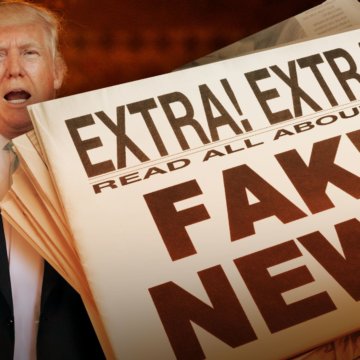- About
- Topics
- Picks
- Audio
- Story
- In-Depth
- Opinion
- News
- Donate
-
Signup for our newsletterOur Editors' Best Picks.Send
Read, Debate: Engage.

Heads are spinning. Is this real news or fake? How can you tell? Are 100 million refugees really flooding the EU? Did Obama really spend $5 billion on a programme to re-educate regular working class Americans in the ways of socialism? How many businesses did Donald Trump successfully run? People are finally questioning the validity of news stories, and with Kellyanne Conway's infamous 'alternative facts' gaffe, people are also questioning what constitutes facts and truth.
I fear this will not last very long. A mainstream name for a public phenomenon is a good start, as it of course allows people to draw attention to the problem. However, since there are no defined parameters for what constitutes 'fake news', it can be used by anyone to discredit news they don't like. For example, while it might be legitimate to criticise content-producing sites for putting out lies such as 'Muslims celebrate on 9/11 in New York' (since that verifiably never happened), the term 'fake news' is thrown about by man-baby-president Donald Trump to describe:
a) News he does not like.
b) Real-world phenomena which are not being covered and/ or not covered accurately (for example crowd sizes).
The latter is particularly problematic, since it uses the term 'fake news' to mean 'absence of news coverage', whereas the term 'fake news' more properly should mean 'news which is demonstrably false, and knowingly produced as such'. Both trends are of concern, since 'fake news' then quickly becomes a pejorative for all news which does not paint the president (or whatever powerful figure/ institution) in a good light; It also puts media into the conspiracy-category ("Well, buddy, you know, the real news is what they're not telling you").
Well, the truth is, the news isn't blind. Mainstream media outlets are biased and are tailored towards specific audiences; They have specific corporate donors which determine the particular spin a story should have. Public opinion is shaped by the media. But this is everything Noam Chomsky told the world about in Manufacturing Consent. What we need to remind ourselves is that fake news, also, is old news. While media outlets are shaped by their audiences and donors, they also do try in earnest to produce accurate, quality reporting. The Guardian, the Sueddeutsche Zeitung, Haaretz, The New York Times are some examples of this.
Fox News, the British Daily Mail, Bild and others are, on the other hand, typically fake news institutions. There's no easy way to say this: They just make shit up. That's why Wikipedia won't accept the Daily Mail as a reliable source of facts - remember, not some ridiculous media upstart like Breitbart or whatever - but an old paper which has a massive circulation and online readership. They just make shit up.
Fake news doesn't always look like fake news. Sometimes it looks real. So there are some things we as consumers of news can do to guard ourselves against the onslaught of imaginary facts: